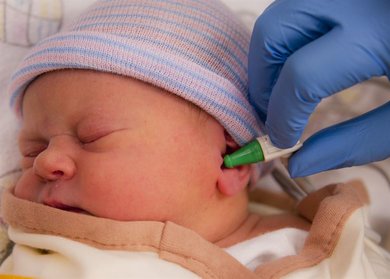May 18, 2021
COVID 19 Vaccination Sites (Pfizer ONLY)

Hearing Screening
There are two screening tests that may be used:
Although most babies can hear normally, 1 to 3 of every 1,000 babies are born with some degree of hearing loss. The newborn hearing screening can detect possible hearing loss and determine if additional tests are needed.
Heart Screening
After the first 24 hours of life, heart rate and oxygen level are measured by placing soft stickers around the infant’s right hand and one foot. Most babies are born with healthy hearts, and have enough oxygen in their blood. About 1 baby in 100 is born with heart defect. Approximately ¼ of these children will have a critical congenital heart defect—when a baby’s heart or major blood vessels do not form properly. A critical defect is one that needs urgent treatment to have the best outcome.
Blood Screening
After the first 24 hours of life, a blood sample is taken from the baby’s heel and sent to the State Newborn Screening Program. The blood screening is used to identify metabolic and endocrine diseases that can be very harmful to the baby. Early detection is key to treating any abnormalities.